@zhongdao
2019-06-30T03:55:30.000000Z
字数 3556
阅读 4487
Miyawaki的森林恢复方法(Boomforest)
未分类
前言
Miyawaki的生态森林恢复方法,在其维基百科上有步骤,法国的boomforest则根据自己的理解加上了图片和简单的解释,我用机器翻译做了中英文对照,放在了下面。
原文链接
http://boomforest.org/en/pages/miyawaki_method
森林恢复方法图解概要
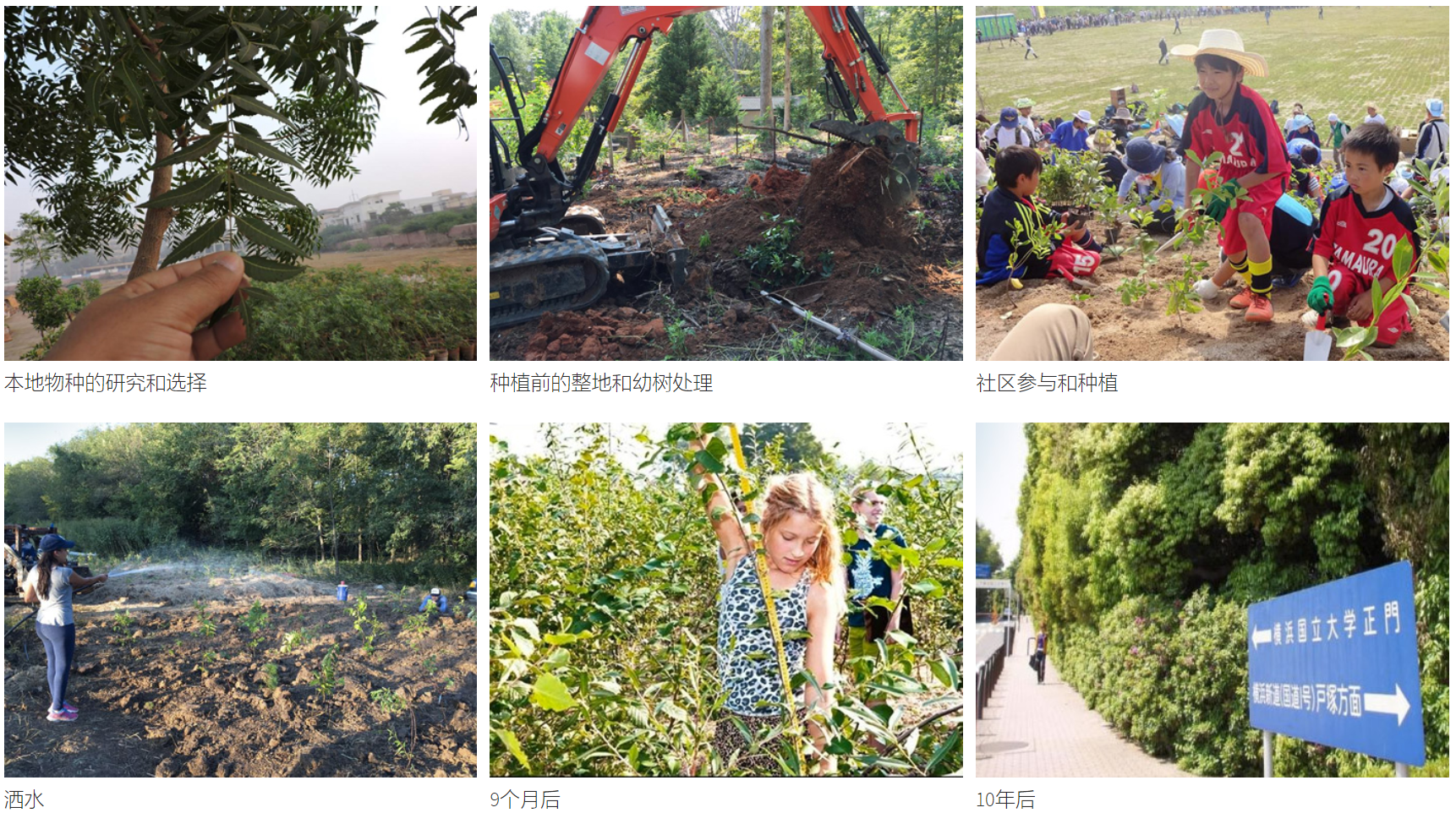
Akira Miyawaki and his method/宫胁明和他的方法
Miyawaki observed the trees which traditionally grew around temples, shrines, and cemeteries in Japan were native species, relics of the primary forest and at the same time he calculated that only 0.06% of contemporary Japanese forests were indigenous forests. Contemporary forests, created according to forestry principles, are not in his view the most resilient nor the best suited vegetation for the geobioclimatic conditions in Japan, neither are they the most suited to address climate change. >> More info on Pr. Akira Miyawaki's life on Wikipedia
宫胁观察到,传统上生长在寺庙、神殿和墓地周围的树木是原生物种,原始森林的遗迹,同时他计算出,当代日本森林中只有0.06% 是原生森林。 当代森林,根据林业原则创建,在他看来,不是最具复原力的,也不是最适合日本地区气候条件的植被,也不是最适合应对气候变化的。 更多关于 Pr 的信息。 维基百科上的 Akira Miyawaki
Referring to potential natural vegetation (PNV) (a concept he studied in Germany), he developed, tested and refined a method of ecological engineering today known as the "Miyawaki method" to restore native forests from seeds of native trees on very degraded soils which were deforested and without humus. Using ecological theories and the results of his experiments, he quickly and successfully restored, sometimes over large areas, protective forests (disaster-prevention, environment-conservation and water-source-protection forests) So take a look on how you could create a Miyawaki forest in your garden, here we go!
关于潜在的自然植被(PNV)(他在德国研究的一个概念) ,他开发、测试和改进了一种今天称为"Miyawaki 方法"的生态工程方法,以便在被砍伐和没有腐殖质的严重退化土壤上从本地树木的种子中恢复本地森林。 利用生态学理论和他的实验结果,他迅速而成功地恢复了,有时是大面积的,防护林(防灾、环保和水源保护林)所以看看如何在你的花园里创造一个宫胁森林,我们开始吧!
Step #1 第一步
Site survey and the discovery of the Natural Potential Vegetation.
场地调查与自然潜在植被的发现。
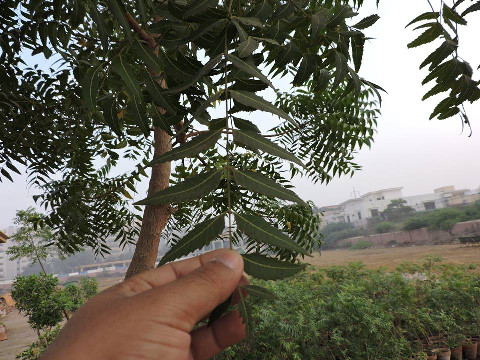
Identification of the native species 20km around the selected zone for the afforestation. It's recommended to identify between 50 and 100 different species, they can be bought at a nursery or found nearby and transplanted.
在选定的造林带周围20公里范围内进行本地物种的鉴定。 建议鉴定50到100种不同的树种,它们可以在苗圃买到,或者在附近找到,然后移植。
Step #2 第二步
Terrain preparation.
地形准备。
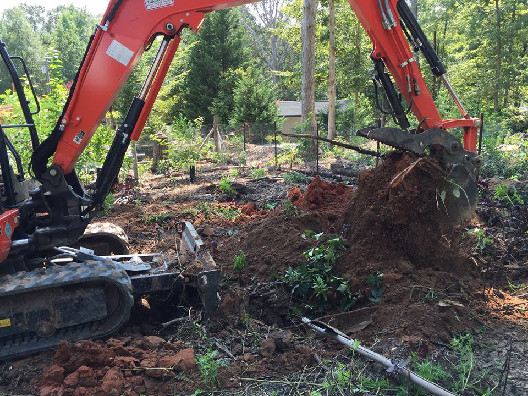
Soil cleaning, addition of organic nutrients, preparation of elements permitting water retention (to be added later once the plantation finished) and the creation of a hill (30 degrees maximum slope).
清理土壤,添加有机养分,准备允许水分保持的元素(在种植完成后添加)和建立一个小山丘(30度最大坡度)。
Step #3 第三步
Plantation by the volunteers.
志愿者种植。
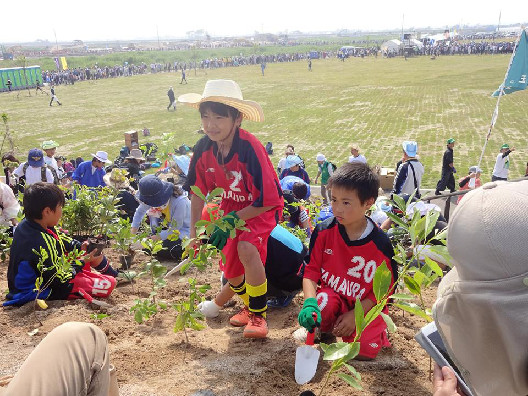
Plant between 3 to 5 little trees per squared meter.
每平方米种植3到5棵小树。
Apply the straw protection, that allow the creation of wood humidity and water retention.
应用稻草保护,使木材保持湿度和水分。
Step #4 第四步
Maintenance.
维修保养。
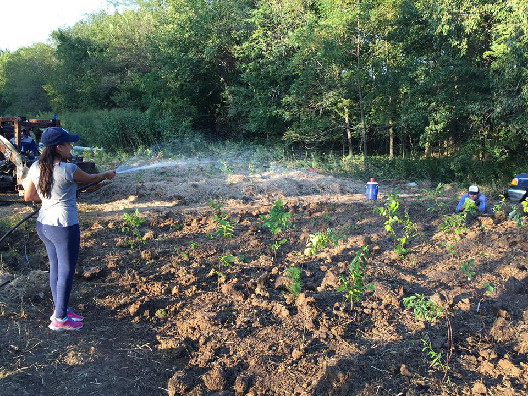
Watering and weed control during 3 years. Reuse the dead plants (mortality tipically around 5%) and weeds as straw putting it on the top of the hill.
3年间的浇水和杂草控制。 重复使用死去的植物(死亡率在5% 左右)和杂草作为稻草放在山顶上。
After 3 years the forest site becomes autonomous. It doesn't need any more maintenance: « No management is best management » according to Prof. Miyawaki.
3年后,森林基地成为自治区。 它不需要更多的维护: 宫胁教授说:"没有管理就是最好的管理。"。
Before and after some Miyawaki plantation 在宫胁种植前后
Here you can see some example of Miyawaki forests, before and after the plantation.
这里你可以看到宫胁木森林的一些例子,在种植园前后。
Paris, France/法国巴黎
Boomforest Association
新兴林业协会
Forest planted with many volunteers next to the "Porte de Montreuil".
在蒙特勒伊门旁边种植了许多志愿者。
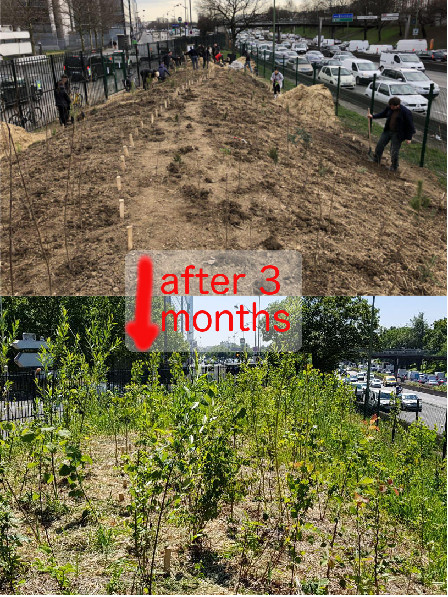
Zaandam, Netherland / 赞丹,Netherland
IVN Natuur Educatie
自然教育

Forest plamnted by the local community of Zaandam of and its school children.
赞丹当地社区及其学生修建的森林。
Bangalore, India/印度班加罗尔
Afforestt
绿化工程

Forest plantewd in Shubhendu Sharma's private backyard.
在 Shubhendu Sharma 的私人后院种植树木。
Yokohama, Japan/日本横滨
Yokohama University
横滨大学

Forest planted by Prof. Akira Miyawaki and his students 10 yeras ago.
由宫胁明教授和他的学生10年前种植的森林。
